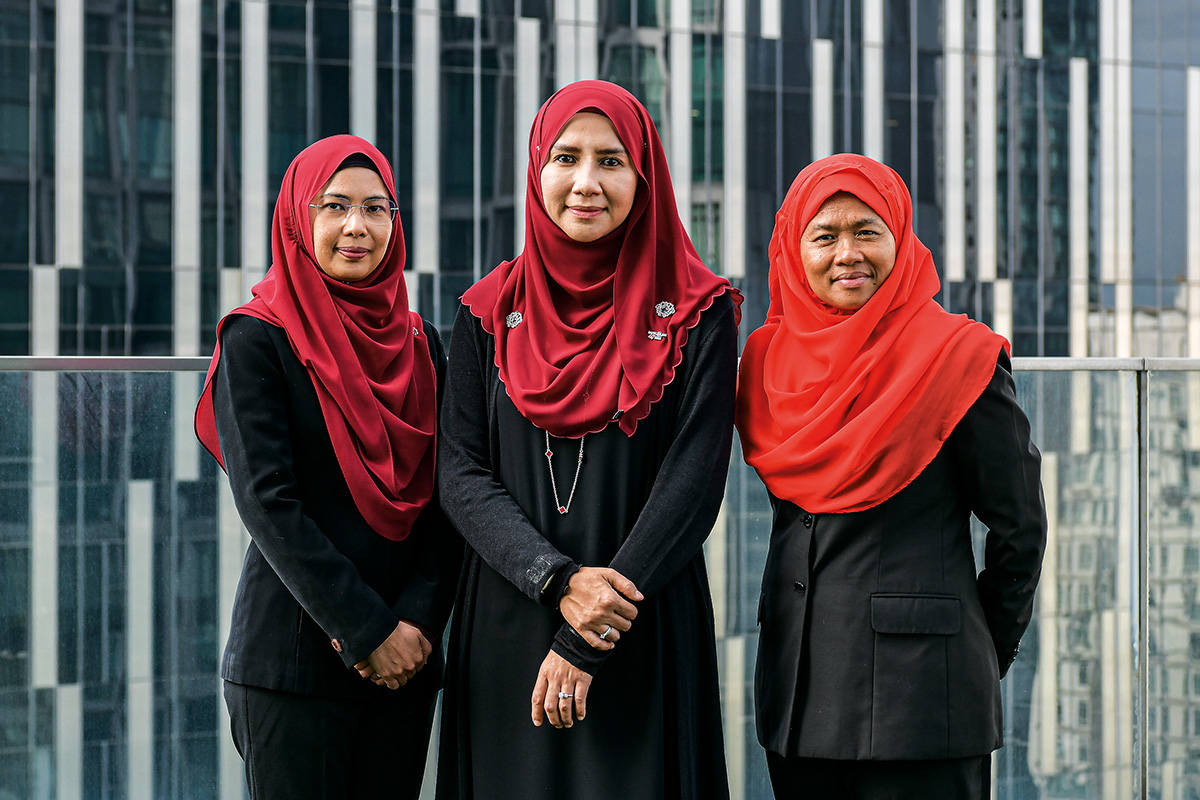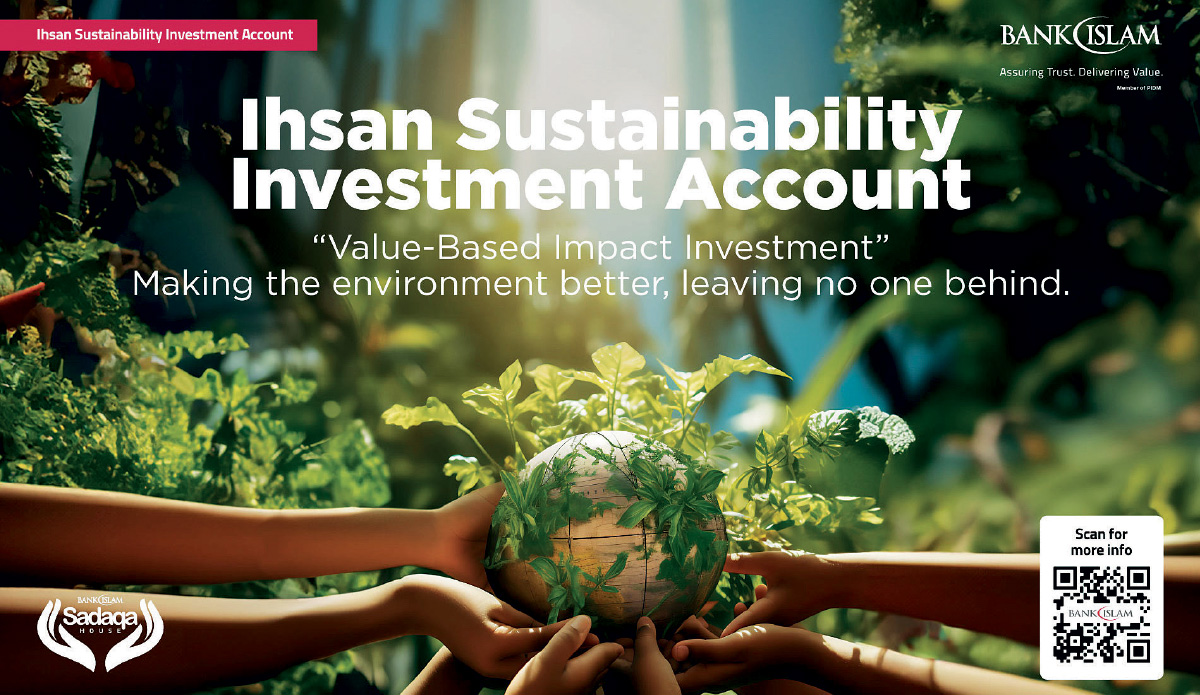

At a glance, successful investing and making an overall positive impact on society do not appear to overlap on the Venn diagram. While businesses are taking the adoption of environmental, social and governance (ESG) principles very seriously — recognising its ability to future-proof a company — investing instruments remain stubbornly traditional.
Bank Islam Malaysia Bhd aims to change this, particularly with its Ihsan Sustainability Investment Account (ISIA). Apart from growing customers’ wealth, ISIA seeks to generate a positive social and environmental impact. While at first glance, this type of product seems out of the norm by investing standards, Group Chief Business Officer (Institutional Banking)Sharifah Sarah Syed Mohamed Tahir points out that the way banks service their customers needs to change.
“Some clients are still being served the same way they were 20 years ago, using the same methodology. We want to offer products that are not just about wealth creation. We want to be able to assist our clients to do good through their investments. But the flip side is that this is where Bank Islam sees opportunities,” she says.
In particular, investor education holds significant importance for the bank to achieve this goal, fuelled by the composition of its client base. Despite having some of the most prominent organisations based in the Klang Valley on its clients’ list, Sharifah Sarah says the bank’s most loyal customers are from Kelantan, Terengganu and Kedah, who may not always have the same access to investment products as investors in the Klang Valley.
“While we serve large corporates, a substantial number of our customers are mid-cap and small-cap clients, and it is with them that we are passionate about growing ISIA. ISIA will enable us to give these segments of clients access to financing. Investors will then have the confidence in our ability to manage the risks of these assets,” she says.
According to Bank Islam, ISIA empowers clients to foster a nature-positive economy that fortifies environmental resilience and promotes inclusive societal growth with an indicative return rate of 4.5% per annum for 24 months. ISIA is not just about returns but about making a meaningful difference while growing clients’ wealth.
Sharifah Sarah explains that although the product’s outline may seem unusual, the structure has its roots in tradition. “We created a fund where the underlying asset is a financing product, which allows us not to be constrained by our capital limits because we know that raising capital is expensive today.
“In the past years, we have seen pockets of efforts by the government to allow a variety of financing tools via the capital market. Examples are crowdfunding and peer-to-peer financing platforms. With these, investors will take risks like on any other crowdfunding platform, but the difference is that Bank Negara Malaysia regulates us. It monitors the bank’s asset quality, which should assure investors that we will not pass them bad credit,” she says.
Instead, ISIA allows companies to have access to a different asset class, she adds.
ISIA will invest in non-retail financing and align with the United Nations’ Sustainable Development Goals (SDG). Another unique feature is the social impact contribution, where 2.5% of the investment return will be channelled to either zakat or Sadaqa House, Bank Islam’s charity crowdfunding platform.
Through Sadaqa House, the bank provides value-added services to collect, manage and distribute donations from the public by channelling such funds towards identifying projects that result in positive outcomes for underserved communities in selected focus sectors.
Apart from the SDGs, additional parameters include Bank Islam’s Green Financing Portfolio, the government of Malaysia’s Sukuk Sustainable Development Goals and the favourable Climate Change and Principle-based Taxonomy (CCPT) classification by Bank Negara.
According to Bank Islam, investments will be divided into four distinct portfolios — the first concentrates on green financing specifically for renewable energy (RE), namely solar. The second portfolio is pegged as other green financing, which covers other types of RE, affordable housing, business activities, clean transport and waste management, to name a few.
The third will concentrate on water management and/or utilities, encompassing clean water and sanitisation. And the fourth is classified as low-risk assets.
Nevertheless, Sharifah Sarah emphasises that Bank Islam goes beyond standard offerings and is ready to customise portfolios to align with investors’ specific goals, giving a more personalised and purposeful dimension to their financial strategy. As to who this investment fund is for, she says it will best benefit those organisations that feel pressured to comply as the ESG wave continues to sweep through industries.
“The incentive is that you have to go green. More prominent organisations, including SMEs (small and medium enterprises) and mid-level providers, are now incentivised to make their supply chain green. We are creating a reason for them to gain access to these funds,” says Sharifah Sarah.
“Bank Islam is accelerating the transition. We are connecting the dots. We want to ensure that no one is left behind.”
For individuals who wish to invest in ISIA, the minimum amount is RM50,000, while for non-individuals, it starts at RM1 million.
It is also important to point out that Bank Islam has been on its ESG journey for almost a decade, according to BIMB Investment Management Bhd CEO Azdini Nor Azman.
“We started our journey in 2015 and currently have seven shariah ESG funds. Previously, when someone mentioned being ESG-compliant, the typical response was often ‘So, what?’ However, this perception has undergone a significant shift in recent years given that companies are now required to report on their ESG compliance,” she says.
Azdini adds that it is likely that these types of investment instruments will become the norm in the future as the younger generation of investors enters the market. “They are aware of ESG and SDGs. These are no longer buzzwords to them. It is the new norm.”
Transforming Institutional Banking
It has been a transformative few years for Bank Islam. It has been just over two years since it took over BIMB Holdings Bhd’s listing status, making it the first pure-play, full-fledged Islamic financial institution on the Main Market of Bursa Malaysia.
According to Sharifah Sarah, this change has also been internal in terms of the management composition. She points out that she spearheaded ISIA along with Azdini and Dr Rosnani Rasul, Acting CEO of BIMB Securities Sdn Bhd, the first full-fledged shariah-compliant stockbroking firm in Malaysia.
It is true that in the ESG conversation now, the topics of diversity and inclusion are becoming more prominent, which is especially significant after the Covid-19 pandemic irrevocably changed the dynamics of human capital.
“When you have diversity, it allows you to be nimble, to see things from different perspectives. Discourse only improves when many genders, ages and experiences are in the same room. Women, for example, have more patience. This is important when you need to innovate, to try out new things,” Sharifah Sarah explains.
Rosnani offers another view. “We are an ageing population, and an area we can improve is our women workforce participation rate, which is currently at 53% to 55%, to [reach that of] regional leaders like Singapore, which has touched the 60% benchmark.
“We need to get more women back into the workforce, and how do you do that? You have women in senior positions who can create a conducive working environment to help them return to work. It is imperative for us to tackle this issue amid our aim to become a high-income nation while addressing the gender diversity issue in the nation.”
Azdini concurs. “We may not agree on everything, but our goal is the same. Specifically, we aim to bring out the best in everything, be it the person, the product or the strategy.”

